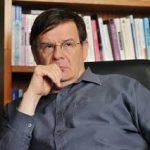The grave nuclear risk of North Korean instability
By Andrei Lankov, July 7, 2016
The "Korean question" is a bit like a dormant volcano. Nothing especially dramatic has happened for decades, and the status quo has now persisted for so long that people have grown used to it. But the sad, simple fact is that the status quo on the peninsula is inherently unstable. Sooner or later, North Korea's political and economic elite is likely to fall. This will present the very risky prospect of violent chaos, in the style of Libya or Syria, in a country that possesses nuclear weapons—and that lies along a strategic fault line where the interests of the United States, China, and Russia meet and often clash.
Roots of instability. In 1948, when the pro-Soviet regime in Pyongyang and the pro-US regime in Seoul came into existence, neither side recognized its counterpart's right to exist. Each government considered itself the sole legitimate authority for the peninsula. Each claimed unification as a long-term goal—though only on its own terms. But while the Stalinist regime in the North inherited from Japan's colonial government the most advanced industrial economy in East Asia outside Japan itself, the right-wing dictatorship in the South took over an agricultural backwater. Over the course of a couple of decades, the tables were turned. The North Korean economy, after a short period of growth, stagnated and began to fall apart. The South became a showpiece, an unmitigated economic success.
Today, depending on how you calculate it, the per capita income gap between the North and South is between 1:14 and 1:40. This may be the widest gap separating any pair of countries with a common land border. The average South Korean enjoys roughly the same purchasing power as someone in France or Italy. The average North Korean can buy about as much as someone in Uganda or Sierra Leone. Thus the South, at least potentially, exerts a powerful allure for North Koreans—who therefore are not supposed to know what goes on in the South lest they become restive and unmanageable. Pyongyang bans tunable radios; allows internet access only for very senior officials (as well as foreigners); and exerts strict control over the nation's few foreign residents. International observers tend to view such restrictions as paranoid. But these measures are vital to the regime's survival. So are Pyongyang's massive security bureaucracy and its large number of camps for political prisoners. In the North, anyone with dangerous ideas must be dealt with promptly and severely.
Making matters worse, members of the North Korean elite (semi-hereditary on all levels) believe that regime collapse would amount to their personal downfall and perhaps even death. If Korea is unified according to the German model—the only realistically conceivable example—the North Korean elite expects to receive no share of power. Thus members of the elite are determined to survive and, if things get ugly, to fight.
In recent years, North Korea's economic situation has improved a good deal—not least because Kim Jong-un, contrary to common perception, is a reasonably good economic manager. Famine is a thing of the past, and entrepreneurs are taking over the economy despite Pyongyang's fierce Stalinist rhetoric. Though the private sector remains technically illegal, it is tolerated, and recently it has even been quietly encouraged. People in North Korea today are much better fed and dressed than at any point since the late 1940s.
But this economic success doesn't make much political difference in the North. When North Koreans assess their lifestyle, their benchmark is not the famine of the late 1990s—but rather China and South Korea, which are still light-years ahead of the North. Moreover, people in the North live under the mighty illusion that, in the event of unification, they would instantly attain the living standard enjoyed by people in Seoul.
In the long run, the status quo is unsustainable. The regime's survival depends on maintaining unity among the elite—not just second- and third-generation apparatchiks from established families but also newly rich business leaders. It depends on continued success in controlling and terrifying the North Korean people. And it depends on maintaining the country's isolation—an increasingly difficult task amid a global revolution in information technology. Nations with a stake in peace on the Korean Peninsula had better devote hard thought now to the prospect of a Syrian-style crisis in the North—a crisis in which nuclear weapons could be very much in play.
Topics: Nuclear Weapons
Share: [addthis tool="addthis_inline_share_toolbox"]














